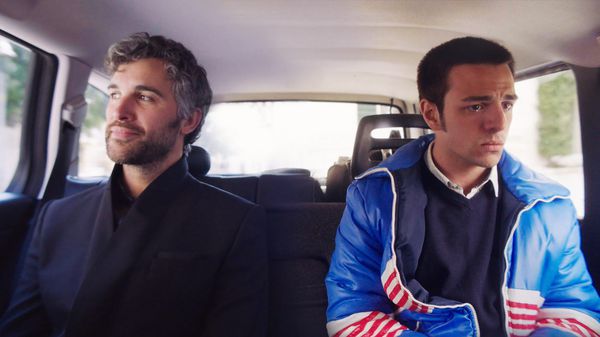Eye For Film >> Movies >> Duino (2024) Film Review
Duino
Reviewed by: Jennie Kermode

The world is full of love stories, but when you’re straight, there are lots of different narratives to choose from. For people whose first love is someone of the same sex, especially if they came of age in the 20th Century, it’s a little different. Such a high proportion of those stories are anchored in tragedy of one sort or another that it’s easy to start shaping one’s own story to fit. Unrequited love is a bigger risk for gay and bisexual people, and speaking up also entails a different kind of risk – or certainly did - but how many of us end up using that as an excuse? There’s a temptation to romanticise situations by writing them off as hopeless – and in the process, perhaps, to miss out on something special.
Fortysomething Argentinean filmmaker Matias (played by director Juan Pablo di Pace) has idolised his first love to the point where it has become difficult to tell the story of it. He has been trying to capture it in fiction, but something just doesn’t feel right. He’s too caught up in thinking about what he should have done but didn’t. With an unexpected invitation prompting him to make a decision about the future, he realises that it’s time to revisit the past and try to engage with its realities.

The Duino of the title is a village on the Adriatic coast of Italy, and the location of the United World College of the Adriatic, to which the young Matias (Santiago Madrussan) won a scholarship. A painfully shy, awkward youth, he isreluctantly dragged onto a stage by a young woman who needs a dance partner, and his fancy footwork wins him a cluster of enthusiastic new friends – most notable wealthy Swiss student Alexander (Oscar Morgan), who compares him to Fred Astaire. An intense friendship develops between the two of them as they explore the local ruined castle, which has its own tragic love story attached, and exchange lines from Monty Python’s The Meaning Of Life. A dreamy summer is abruptly cut short, however, when Alexander is expelled, and still Matias has said nothing.
He will get a second chance, spending Christmas with his friend in Switzerland, where the two bond in a way that gives him every reason to imagine that his feelings might be reciprocated, but it’s complicated by the presence of Alexander’s flirtatious sister, and jealousy ensues. Meanwhile, Matias reckons with an earlier layer of past and his complicated relationship with his parents, which emphasises the significance of other kinds of emotional bond for young people trying to find their way in life. There is an implicit suggestion that his feelings for Alexander have hit him with such force because he felt starved for affection at the outset – but can resolving one situation help him with the other?
The story of Matias’ past is interwoven with the present, in which the filmmaker pushes for reshoots, straining his friendship with producer Paolo (Juan Cruz Márquez de la Serna). They’re up against a festival deadline and Paolo seems concerned that even if he gives in, Matias will be unsatisfied and continue to tinker. At some point in making a film, one has to let go and accept imperfection. Can Matias learn to accept the imperfections of his past? The relationship between fiction and memory, artifice and life undergoes subtle shifts over the course of di Pace’s tale, further complicated by its foundation in his own life, and in doing so it invites us all to take on the challenge of reassessing the too-neat narratives we often cleave to.
Reviewed on: 17 Oct 2024














